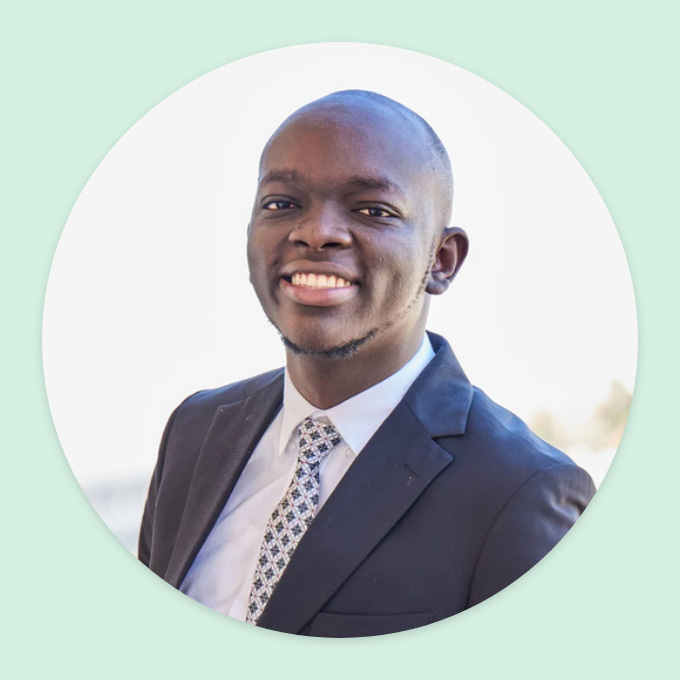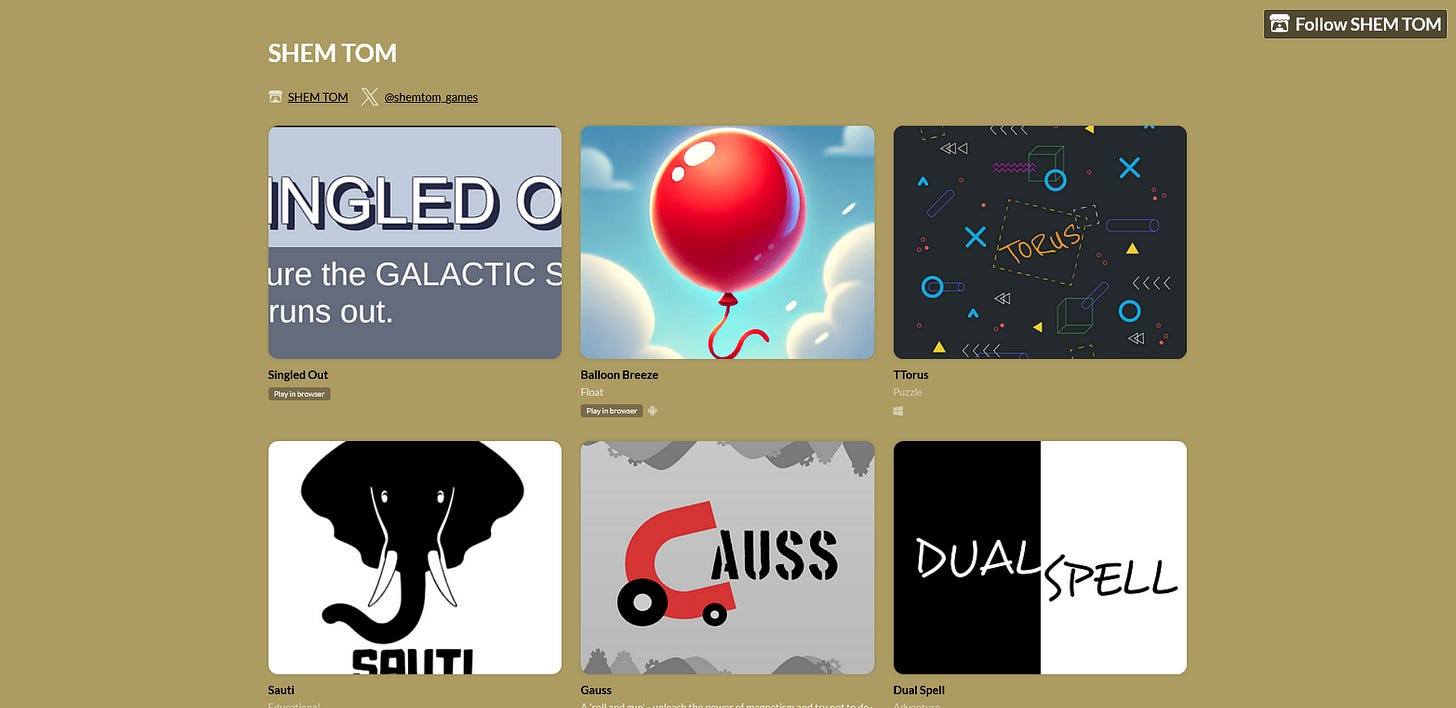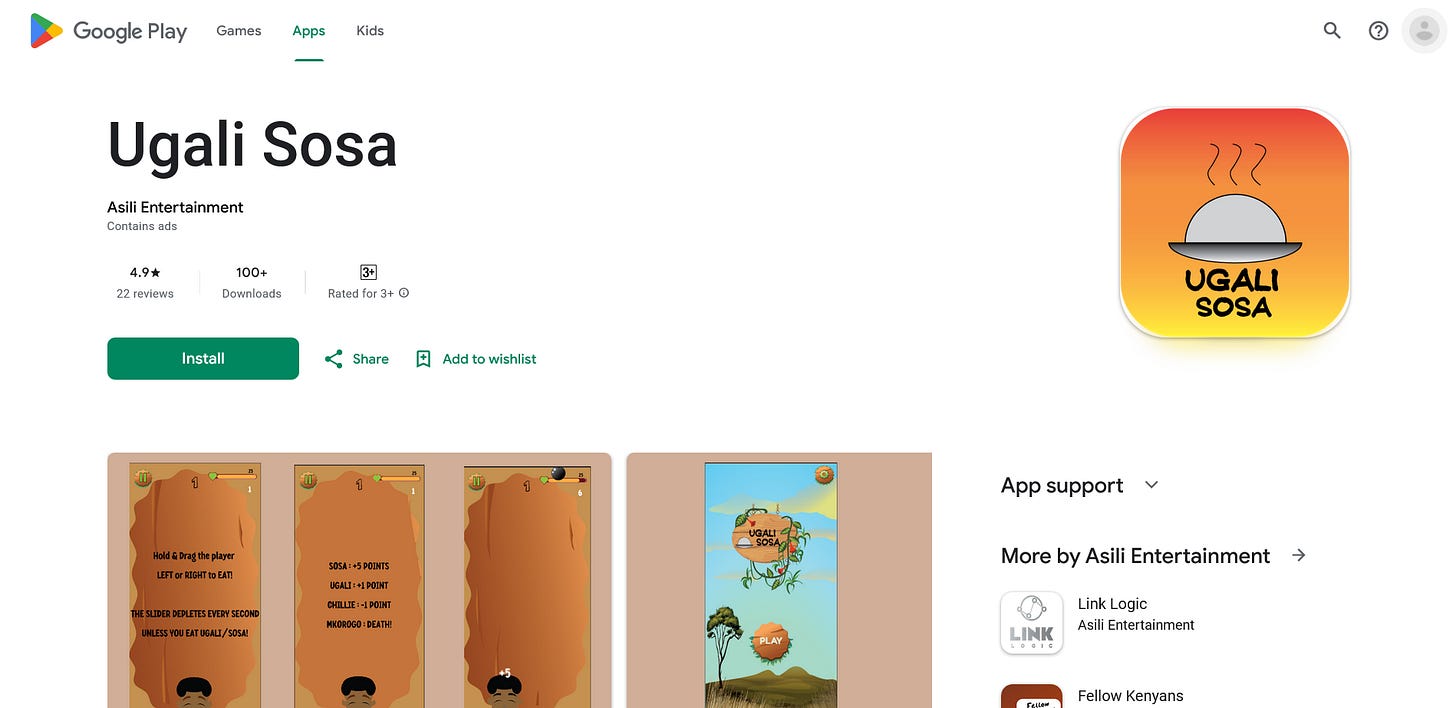Small studios that make games in Africa, meet Asili.
A collaboration between Shem and Tehillah.
1.Hi Shem, what's your background and what has been your career? (Has it always been tech or there was something before tech, job, school, how you got into tech)
Even before joining primary school, I had a passion for drawing. I used to draw a lot as a kid, though I’m not sure what went wrong—it suddenly vanished as I grew older. When I transferred to Aga Khan Primary School, we had art classes, and I rediscovered my interest. I was really good at it, but tech eventually sparked a deeper passion in me, and my focus shifted.
Sometimes, I wonder if I still have that artistic side in me, though it’s been a long time since I actively pursued it. A part of me feels that my parents could have been a great motivator in helping me establish and develop those artistic skills further.
My journey into tech began in 2012 when I was in Class 5. Transferring schools exposed me to new experiences and opportunities to learn. For instance, Aga Khan Primary School introduced me to computers as a subject. We had typing classes where we worked on speed and accuracy, and during our free time, we occasionally played games on FRIV. I became particularly hooked on a game called Power Pamplona.
This interest in games eventually led me to create my first video game, Sanse, using Unity in 2020, just after completing high school (KCSE). Developing Sanse was a learning curve—it wasn’t perfect and had plenty of bugs, but it was a project I was proud of. I even hired someone on Fiverr to create character assets; the character was meant to resemble Khaligraph (OG).
My love for video games started even earlier, during my primary school years, when I played games like GTA: San Andreas and Vice City. My younger brother and I faced restrictions from our mom, who was quite strict about the family laptop. However, that didn’t stop us. We’d sneak around and play whenever we got the chance.
In 2013, when I was in class 6, my mom surprised us with a PlayStation 2 as a gift, which was a game-changer. It was a privilege because, in our neighbourhood, we were the only kids with a PS2. I still remember the thrill of playing CARS 1 and Tomb Raider on it.
When I joined high school, things shifted dramatically since I attended a boarding school. Gaming became rare as I no longer had access to consoles or computers. Initially, we played Pro Evolution Soccer, but soon, FIFA became the go-to game.
It wasn’t until university that I got back into gaming more consistently. Campus life offered more flexibility, which allowed me to dive into game development alongside my IT course. While both game development and IT are part of tech, game development required me to step outside the classroom and teach myself many new skills.
Looking back, I feel my journey into tech blends my early love for art and my passion for games. Maybe that artistic spark never truly left—it just evolved into creating experiences through gaming.
2.You could have worked on literally anything else, why mobile games specifically? (How did you end up in games)
From the moment I became interested in games, I held onto that dream. Initially, my focus wasn’t on mobile games specifically—it was on games in general. As I learned more about how the industry works, I realized the potential of mobile games, especially since most of our target audience primarily uses mobile phones.
The ubiquity of mobile phones made it clear that this was the best place to start. Mobile games became my main focus because they align with the habits of our users, but I’m not limited to just mobile games. We’re currently working on expanding to cross-platform gaming. Soon, our games will be accessible on both web and mobile platforms, allowing users with laptops, PCs, tablets, and mobile phones to enjoy our creations. This shift is partly driven by the high costs associated with publishing to app stores. By offering web-based options, we ensure iOS users can play our games without needing an app.
I ended up in game development because of my deep interest and curiosity. I wanted to focus on this area and master it before applying my skills to other fields, such as app development. Interestingly, app development came naturally to me—I was able to learn and understand it quickly. Harnessing skills in both mobile app and game development has been rewarding, as it allows me to be flexible and explore how these two areas complement each other.
3.How do you come up with ideas on the games to build? (tools, time and resources used)
Initially, we would look at trends or funny, engaging concepts that could fit into our games’ core mechanics. This approach worked to some extent, but it wasn’t sustainable in the long run. So, we changed our model to focus on prototypes.
Now, we start by creating game prototypes in about 3 days to a week. Once the prototype is ready, I share it with my colleagues, who provide insights on areas to improve or whether the game idea has potential. If the feedback is positive, we proceed to full development, which typically takes around 2 to 3 months.
Our game ideas often come from our daily interactions and activities—observing the world around us and figuring out how to translate those experiences into game mechanics. Another source of inspiration is playing a wide variety of video games. This allows us to identify mechanics we can tweak, adjust, or build upon to create something new and unique.
In terms of roles, I primarily focus on project management and programming, while my partner handles design and UI/UX. This division of labour ensures we play to our strengths and produce well-rounded games.
We mainly use Unity/Godot as our game engine tool, Trello for our project management and Blender/Photoshop/Illustrator for the design.
4.Which is your most successful game and how did it come about?
While I wouldn’t call it entirely successful, we had a glimpse of success with Ugali Sosa. This game was a collaboration with Shauku Games, initially founded by Tehillah Kachila. The concept aimed to combine humour with a simple and engaging mechanic. I developed the core mechanic, while Tehillah contributed the unique idea of incorporating ugali and nyama as central elements. This made the game relatable to Africans, particularly Kenyans, who connected with its cultural relevance and light-hearted theme.
Although the game currently has several bugs, we are planning an update to refine it. Despite its imperfections, Ugali Sosa was a standout concept that resonated with players, building a small but enthusiastic fan base. It has given us valuable insights and motivation to release more games in the future that capture similar levels of engagement and enjoyment.
5.What are some challenges that you have faced and how did you overcome them?
One of the biggest challenges I’ve faced is generating sufficient income to sustain the studio. To address this, I took on freelance work to support myself financially while continuing to hone my game development skills and pursue my dream. Balancing freelancing with game development has been tough, but it has allowed me to keep the vision alive and steadily progress toward my goals.
Another significant hurdle was the lack of a specialized team. Due to limited resources, I couldn’t bring in experts for various roles, so I had to learn multiple aspects of game development myself. From design and programming to project management, I taught myself the skills necessary to fill these gaps. While challenging, this self-reliance gave me a deeper understanding of the development process and strengthened my versatility.
Long development times were also a persistent issue, especially with limited resources and manpower. I overcame this by focusing on creating prototypes first, which allowed me to test and validate ideas before committing to full-scale development. This approach not only saved time but also ensured that the final product was more polished and aligned with players' expectations.
Each of these challenges has shaped me into a more resilient and adaptable developer, reinforcing my commitment to creating meaningful and enjoyable games despite the obstacles.
6.Financially/user acquisition wise how did your most successful game do?
Financially, my games have faced challenges in generating significant revenue. However, I’ve used my skills as a freelance game developer to earn up to Ksh 160,000 in a year, the highest I achieved (though this amount varied).
In terms of user acquisition, my most successful game, Ugali Sosa, attracted over 200 players. At the time, I hadn’t implemented ads or monetization strategies, which limited its financial success.
Looking ahead, I’m focused on developing more games and growing my game development studio to achieve greater impact and sustainability.
7. What is something that you have had to do to survive as a mobile games company in Africa? (funding, mergers, acquisitions…)
I would say consistency and passion are vital. However, money is the key factor for any company’s survival, and it hasn’t always been readily available for us. Interestingly, we haven’t given up on our dream of making games. Our approach has been to work elsewhere while simultaneously developing our projects. This enables us to support ourselves financially in the long run as we build our company to a desired standard. It will take time, but we remain hopeful, and there’s a significant chance we will achieve our goals.
8.What are some of the mistakes you’ve made as a founder and game developer?
One of the biggest lessons I’ve learned is that not everyone shares your vision. While my passion for game development has inspired others to join me on projects, many lose interest or get distracted along the way, which has taught me to rely on my own consistency and dedication. I’ve also made the mistake of trying to do everything myself, which led to burnout. It’s essential to prioritize, delegate, and accept that progress takes time. Patience and consistency are crucial, yet I’ve often been too eager to achieve everything at once. Lastly, I’ve found it surprising how strangers can sometimes be more supportive of your dreams than close friends or family. This has reminded me to focus on building a network of people who truly believe in my vision.
9.What are some of your future plans?
We aim to build a strong fan base and engage dedicated testers for our games. Additionally, we are exploring ways to create socially and educationally impactful games that help kids and society learn new things through video games.
Our ultimate goal is to generate enough income to focus on game development full-time as a career. While this hasn’t been fully realized yet, we continue to work multiple jobs simultaneously to support this plan and turn our dream into a reality.
10.If you had the chance to do things differently, what would you do?
I believe everything happens for a reason, and life doesn’t come with a manual. Every success and failure have played a role in shaping who I am today, and I wouldn’t change anything from my past. This journey has been a learning experience, filled with challenges that have built resilience, creativity, and determination.
If anything, I might focus more on building partnerships earlier and seeking mentorship from industry leaders. Perhaps I would have explored alternative funding sources or pushed to create a more significant global presence for our games from the start. That said, I view every step—whether smooth or rocky—as part of the process that has led me to pursue my calling and purpose with unwavering passion.
Ultimately, I believe the experiences I’ve gained have been invaluable, and I’m excited to see where this path continues to lead.
11.Where can people go to know more about you and your work?
You can explore my work and get a sense of my creativity through various platforms:
• Itch.io: I publish prototype games and experimental ideas here. Check them out at shemtomke.itch.io
• Google Play Store: Discover the games I’ve developed and published for Android devices. Visit my developer page on Google Play Store Developer Profile
• Portfolio: For a comprehensive look at my projects, experience, and background, visit my portfolio @ shem-tom.weeblysite.com
<Bonus Question>
Getting personal, what does success look like to you as an individual and at what point would you say you have achieved said success?
To me, success is deeply tied to achieving the goals I’ve set for myself, both personally and professionally. One of my biggest aspirations is to work full-time in game development—the career I’ve envisioned and passionately pursued over the years. Being able to dedicate all my time and energy to creating games would signify a major milestone in my journey.
Beyond personal fulfilment, success also means seeing people genuinely enjoy and connect with the games I’ve developed. Knowing that my creations bring joy, spark imagination, or even inspire others would be incredibly rewarding. At the heart of it, success is about turning my passion into a sustainable career while leaving a lasting impact through the games I create.
I’d consider myself successful when I’m not only working full-time in game development but also reaching a point where my games have built a strong fan base and are recognized for their quality and creativity. It’s not just about financial gains but also about contributing to a vibrant gaming culture and being part of something meaningful that resonates with people.
Related Stories:
This game has 676.5K followers on Tiktok and once made $10K in a month.
You probably got here by mistake, click below so it’s intentional next time…






